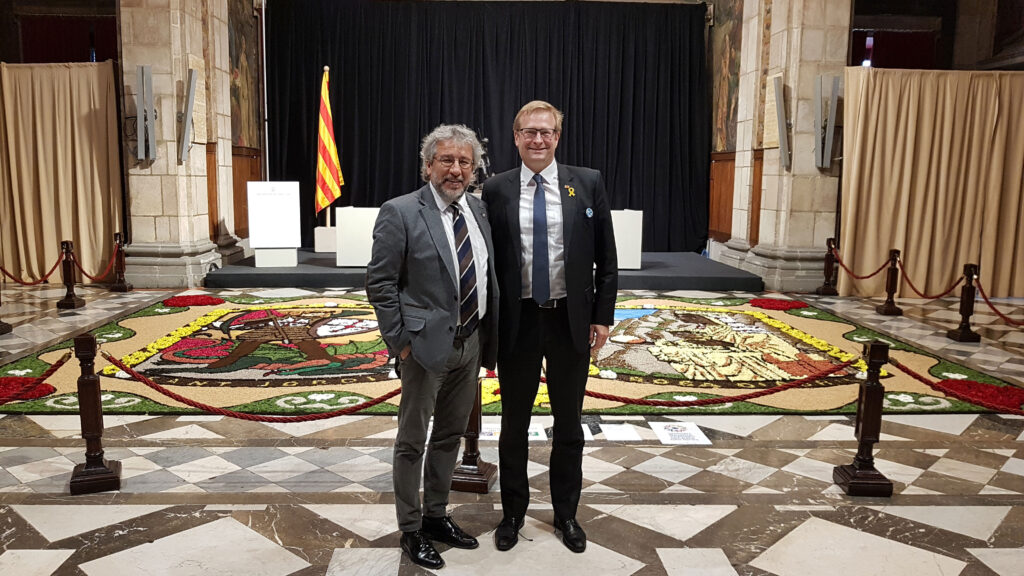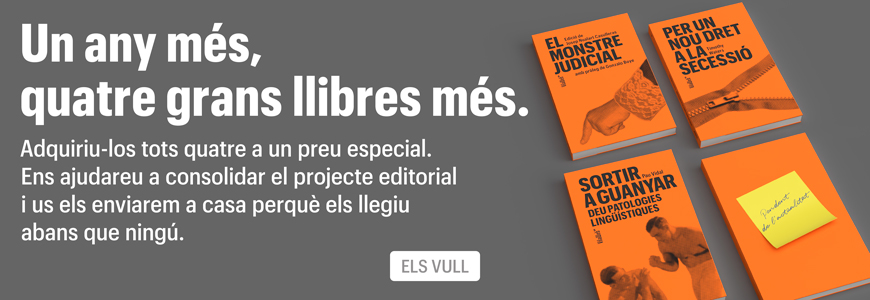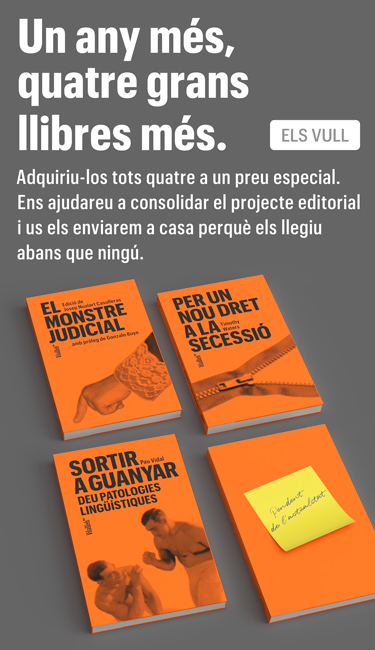26.11.2019 - 09:07
|
Actualització: 26.11.2019 - 10:07
Thomas G. Schulze (@Prof_TGSchulze) is a renowned psychiatrist, a professor at the University of Munich, president of the International Society of Psychiatric Genetics and a member of the World Psychiatric Association’s executive committee. Schulze first visited and subsequently fell in love with Catalonia in 1994 during a stay as an Erasmus student. In just a few months he learnt the language, which he still speaks fluently, and made good friends.
Whilst browsing the internet on a flight between Mexico and Frankfurt on 1 October 2017, Schulze saw the police charging the voters during Catalonia’s independence referendum. He decided there and then that he couldn’t remain silent and that something had to be done. He went back on Twitter and shortly after he became the president of Foreign Friends of Catalonia (@Foreign_Cat). The association’s members are individuals from across the world who are sympathetic to Catalonia’s plight. The organisation serves as a way of networking and a means to organise activities to tell the world about Catalonia and help people better understand the situation. Schulze is currently on a sabbatical with his family in Syracuse, in the United States. I spoke to him via Skype.
—Where does your passion for Catalan culture come from?
—People think that I must have a Catalan wife or some family connection with Catalonia, but it’s not the case. It just so happened that I studied medicine in Germany and during the 1994-95 academic year I came to Barcelona as part of the Erasmus program. When I arrived, as far as I was concerned, Barcelona was Spain, but I soon realized I was mistaken. I learnt Catalan, because my classes were in Catalan and because the friends I made spoke Catalan. I liked it a lot. I immediately became passionate about Catalan and Catalonia in general. I realised that it was a different country, with its own history, and in just a few months I was totally immersed in Catalan culture.
—Is that why you speak Catalan so fluently?
—I learnt it back then, yes, and I kept it alive by talking to my friends. And now I speak it and I write it every day, especially on Twitter. I’m always looking for ways to practise it wherever I am.
—You’re the president of Foreign Friends of Catalonia, an association which was set up relatively recently and which has gained a certain amount of notoriety in a short time.
—Well, I’m the president, but Pat Vila is the soul of Foreign Friends of Catalonia. It’s really her brainchild and, in fact, as I always say, Foreign Friends started as a Twitter account, created by Pat, which started off only following non-Catalans who were tweeting about the Catalan independence process from outside of Catalonia. I was one of the people the Foreign Friends account began to follow on Twitter, in the spring of 2018. And that’s when it all took off.
—When did you start tweeting about Catalonia?
—I had an inactive Twitter account, but I reactivated it on 1 October 2017. I was on a flight from Mexico to Frankfurt and I wanted to get some sleep, but it was impossible, as I turned on the news and saw what was going on at the polling stations and I couldn’t believe it. I decided that I couldn’t remain silent, so I started tweeting. I kept it up for a few months, with very few followers -around fifty- but in April 2018 Pat [Vila] wrote to me. We’d never met, but she told me they needed someone who would be able to travel to Berlin to represent Foreign Friends, as they had a meeting set up with President Puigdemont. I agreed, and that’s when, for the first time, I introduced myself as a member of Foreign Friends of Catalonia. That’s when Foreign Friends started to grow, so we decided we needed to do more and register as an official association. We did it in Germany, to avoid any potential problems in Spain, as you never know, registering the association with the Stuttgart Municipal Court.
—You told me that a couple of years ago you had fifty followers on Twitter; now you have twelve thousand. Foreign Friends has almost twenty-eight thousand, a number which continues to grow. Do you think Catalonia has many more potential ‘foreign friends’ around the world?
—Sure. There are always people who are interested in different causes when it comes to democracy and freedom and there are a lot who see that great injustice exists in Catalonia and that it’s unbelievable that this goes on in a European country in the twenty-first century. And if, aside from this group of interested individuals there are those, like me, who have had the opportunity to get to know Catalonia, then it is almost inevitable that they’ll become a ‘foreign friend’, whether they belong to the association or not.
—You call it ‘grassroots diplomacy’…
—That’s right. There are many kinds of diplomacy. For example, I always wear a yellow ribbon to show solidarity with those who are in prison and in exile and the Catalan flag or the pro-independence estelada on my lapel at every public event wherever I go, whatever the occasion. If I attend a meeting or a conference with my psychiatric colleagues, for example, people usually ask me what the badges mean, and if they do, I tell them. In this simple way, interest about Catalonia grows, as does the desire to learn more about what is going on there. And it really works, beyond all the official channels. And it must be said that there are a lot of people within Foreign Friends who hold important posts in organizations all around the world. For example, I’m a member of the World Psychiatric Association’s executive committee. This means that in the world of psychiatry I’m quite well known. And I’m also president of the International Society of Psychiatric Genetics. Last week, for example, we held our annual congress in Los Angeles. Five hundred professionals took part and they all saw me giving my speech while wearing a yellow ribbon. As I’m sure you can imagine, lots of them asked me what it was and I told them. And at the end of the conference, a Catalan girl, who obviously wasn’t aware that I speak Catalan, came up to me and said, in English: “Thank you so much for everything you’re doing and for wearing a yellow ribbon”. This has happened to me several times and I’m thrilled. Another example: a few days ago, a French colleague of mine who’s working with me on a European project tweeted me to say that they were grateful to have the financial aid provided by the European Union and to be able to work with researchers from Germany and Catalonia. They didn’t say from Spain. Two or three years ago they’d never have said ‘Catalonia’. This is grassroots diplomacy. Which means that every one of us, wherever we are, whatever we do, can represent Catalonia in a completely natural way.
—Is this Foreign Friends of Catalonia’s main objective?
—Our statutes state that our mission is to promote Catalan culture and foster projects involving journalists, researchers and professionals in order that they can travel to Catalonia to learn about it and understand it. We aim to be a platform for discussion where individuals can freely discuss the right to self-determination. Beginning with this starting point there are many goals. We aim to create a connection between Catalan society and people from abroad who are interested in Catalonia. Above all we do not have any political affiliations; in other words, we don’t represent any one political party. We maintain contacts with everyone and we talk to everyone, but we don’t represent anyone. For example, we helped the German MP Andrej Hunko to come to Catalonia last year and visit some prisoners. That’s the sort of thing we do. We have a number of projects such as Come, Research & Talk and Come, See & Talk, which already exist, and Catalunya Open Doors, which will be held next Sant Jordi on April 23, which will host many people from outside of Catalonia. It’s a really important project, and we’ll be releasing the details shortly. In other words, what we want is that anyone who’s interested can find out about Catalonia and learn that it’s probably quite different from what they’d originally thought.
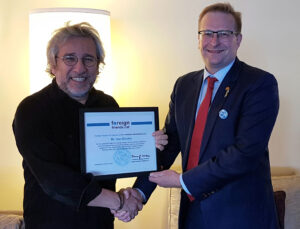
Turkish journalist Can Dündar and Thomas Schulze in Barcelona
—As a German who’s also living in the US, do you think the world understands Catalonia enough?
—No, I don’t think so. It still doesn’t understand it enough and there’s still a lot of work to be done. But it’s true that the number of people who increasingly understand it better is growing every day. And the number of people who are interested is growing even more. Those who have some idea of what’s going on have already noticed that a large percentage of Catalans want independence, but that doesn’t mean they understand Catalonia. And that’s why there’s this second level within the association, which is about offering the possibility of coming into direct contact with Catalonia and, above all, with the people of Catalonia, without intermediaries. What has happened to the prisoners, with the riots, with the process, it’s terrible, but it has grabbed the attention of people abroad. Now we need to make sure that those who are interested have the opportunity to get to know and understand this nation.
—They have to understand us better… Do you mean that maybe they don’t see us in a positive light?
—The world sees Catalonia more positively than negatively. That’s how it is. But the fact that what goes on in Catalonia is also within the EU raises an interesting question, because on the one hand, people who are aware of what’s going on are outraged, while on the other there are people who think that precisely because it’s inside the EU, Spain can’t be so bad or else they wouldn’t allow it. In contrast, people are probably more inclined to support Chile or Hong Kong than Catalonia.
—With the protests following the Supreme Court’s ruling, Catalonia is once again on the front pages of international newspapers…
—Yes, and it’s a bit sad, because at this point I believe that pro-Spanish propaganda has had a certain degree of success. There’s been talk of the riots without providing any context and without talking about the dozens of demonstrations involving thousands of people in which there were absolutely no incidents. In France, for example, it’s normal to burn dustbins and other things in demonstrations and protests. And to talk about people being violent is unfortunate as it’s not really true. The international media has other problems such as Brexit, Trump, etc., and it tiptoes around Catalonia, without really explaining what’s going on. Just a few minutes ago, I sent an email to Amnesty International in Germany, I’ve been a member for ten years. I wanted to complain because they talk a lot about Chile and other conflicts, but they don’t say anything about the rubber bullets fired by the police in Catalonia and the people who have lost an eye, for example. This infuriates me.
—What can we do?
—It’s not easy! I always say that Catalonia must continue with its peaceful protests and, above all, Catalonia must keep being Catalonia. I feel like there are a lot of Catalans who still have an inferiority complex. If you feel you’re Catalan rather than Spanish, there’s no need to say you’re Spanish when you go abroad and they ask you where you’re from. I don’t understand it and I’ve seen it on numerous occasions. I feel like I’m a bit extreme in this sense. It’s like when Catalans switch languages and start speaking in Castilian. Why do they do that? I have pro-independence friends who work with Spanish researchers or colleagues or people from other parts of the world who have lived in Barcelona for months. They hear Catalan every day, but they speak to them in Spanish. I don’t get it. I say to foreign researchers: ‘Look, now you’re in Catalonia and the language of the country is Catalan; so you have to learn it and in a few months or a year I hope you’re fluent; We can speak in another language for now, but in a few months’ time I’ll only speak Catalan’. I’d do the same if we were in Germany, and it’s what I actually do in the US. It’s not nationalism, it’s normal. I always say that I’m in favour of protecting Spanish in Catalonia, but only after Catalonia becomes independent. Before it happens, there’s no need.
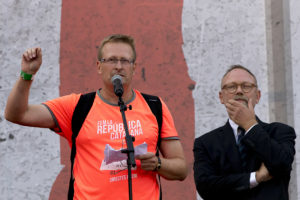
Thomas Schulze during Catalonia’s National Day in 2018
—Are you disappointed by Europe’s reaction?
—Yes, it’s unbelievable. Recently I’ve been saying that the Catalan process and Europe’s response to it have turned me into an anarchist. I’ve never been on the left, I’ve always been a moderate conservative, but the Catalan process and Europe’s response have turned me into an anarchist. Europe’s response is very sad, it’s embarrassing. The European Union is a terribly inefficient, undemocratic club; I’m fed up with it. And I say that I’ve become an anarchist because, in fact, I want to break up the EU. I want a real Europe of its peoples, of small countries and organisations. And as a scientist, I believe it would work much better that way. People could identify with it in a real, functional way which would be much more efficient. Those who criticize me tell me that what I want is a Europe like it was five hundred years ago. That’s not true. Now we have the technology to do it right, we have blockchain technology and lots of other tools which can ensure people have more power and that they can organize themselves much more effectively than with institutions. In fact I think this is what scares them: they see that the Catalans, and everything they’ve done and everything they do to organize themselves, such as the referendum, have a certain amount of power and they realize that people can be organized without the political parties and in opposition to political parties. Obviously this frightens them. I want a Europe of its peoples and regions, one which is much more self-organized.
—It doesn’t look like the European Union is headed in this direction…
—In fact, I have a proposal which many who favour independence may not like: why don’t we conduct an experiment with an independent Catalonia, but only for ten years? And then we evaluate it, like people do in scientific research. In other words, after ten years we can evaluate the experience and see if it was a good idea to let the Catalans vote. It’s a long way off, but from a scientific point of view it would be the most logical solution to the conflict. The European Union could suggest things like this, which is why it disappoints me. Very much. This is why we ought to engage in a different type of diplomacy, grassroots diplomacy, or whatever you want to call it.
—To wrap up, as a psychiatrist: does the situation in Catalonia have an effect from the point of view of mental health?
—It’s really obvious that it has a psychological impact. The suffering, whether directly or as seen on TV, has a clear impact on mental health. And it’s not just one-off, it can also be transgenerational. The two million Catalans who have suffered and who feel themselves to be the victims of aggression won’t give up and it’ll stay in the families’ collective memory. For years and probably for generations. It’s true that there’s such a thing as Catalan resilience, but it’s a trauma which will obviously have emotional side effects. It all comes down to epigenetics, but that’s another story, or another interview and I’m sure we can talk about it in a few years’ time.
